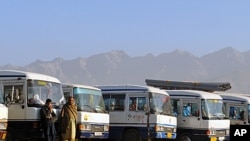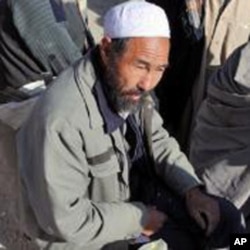Growing insecurity and unemployment in Afghanistan is forcing Afghans into the capital, across borders and into the insurgency looking for work.
Every day hundreds of men gather at Kote Sangi; one of the busiest intersections in Kabul. They fill the intersection waiting for work; they pass time talking and joking over cups of tea.
The workers say from morning until afternoon they wait and breathe in the pollution.
They say in Dari there is a saying that "if you are bored and have nothing to do, go outside and measure the roads."
The workers say that is what they are doing; they are measuring the roads.
Searching for work
Employers needing help pull up to hire laborers for 300 Afghanis - about $6 - a day. Most of the men say they find work once or twice every few weeks.
Most of the men lived as refugees in Pakistan or in Iran with their families. After the Taliban government was ousted in 2001, President Hamid Karzai started calling back Afghans living abroad and promised to bring jobs to the country. Many people returned voluntarily and others were deported from the countries where they lived.
Country-wide issue
There are dozens of places in Kabul similar to Kote Sangi where laborers wait to be hired. Farid Raaid from the Ministry of Labor, Social Affairs, Martyrs and Disabled, says the unemployed come from all over the country.
"We can say half of those jobless in Kabul city they are coming from the provinces. Because if you go to Kote Sangi you will see people from Maydan Shar, from Wardak, from Parwan district, from these areas," Raaid explained. "If you go east of Kabul - the same problem, with the people who are coming from Laghman and Kunar and these provinces."
The ministry estimates that about 3 million of the country's 8 million workers are jobless. Of that 3 million, 70 percent have no formal skills or training.
Returning refugees
Since 2001 the U.N. has helped 5 million refugees return to Afghanistan, nearly 17 percent of the total population. Officials at the U.N. High Commissioner for Refugees say many of the returnees found jobs, especially those who had learned some skills while out of the country. It is those without any education who are left jobless.
Today, growing insecurity throughout the country forces people from places with little security to head to Kabul looking for work. When they can not find it here, many pay bribes to cross the border illegally into Pakistan and Iran.
Exodus
At the Peshawar bus station on the outskirts of Kabul, laborers in search of work pack into buses. They are heading for the Pakistani border.
One man says they are going to Pakistan because the weather is cold, there is no opportunity for work here [in Afghanistan], and after two or three months when the weather warms, they will come back.
Anis, the control manager at the bus station, says the cold weather is not the real issue.
He says other countries say Afghanistan in secure, but this is not the case. He says there are provinces where the weather is warm. The people are leaving for Peshawar to find work because there is no security, Anis says.
Taliban connection
Officials say the link between insecurity, insurgency and unemployment is great.
They use the saying "$10 Taliban" in reference to those who fight for the Taliban for financial reasons. They can not find work, they need money to feed their families and the only way to get it is to join the insurgency, which in some cases pays better than other employers.
Raaid at the labor ministry says in Kabul, young school graduates also face unemployment. Of the more than 60,000 who graduate from high school a year, only a quarter make it into universities. The rest largely are jobless.
"The higher the unemployment rate goes, the people and the youths are going to be absorbed or employed by insurgents, that is why the graph of insecurity rises the same," Raaid said.
Hopeful outlook
Despite criticism that the country has seen little increase in the number of jobs in the past 10 years, Raaid says many good projects come out the ministries and other organizations. Officials now are considering setting up vocational training centers in every province and sending laborers to other countries for work and training.
He says the right people and the right projects are in place - even in remote areas - but insecurity does not allow them to be implemented, so the unemployment rate grows.





